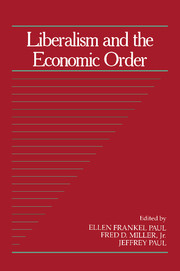Book contents
- Frontmatter
- Contents
- Introduction
- Acknowledgments
- Contributors
- The Social Market Economy
- From Post-Communism to Civil Society: The Reemergence of History and the Decline of the Western Model
- Asymmetrical Reciprocity in Market Exchange: Implications for Economies in Transition
- Institutions, Nationalism, and the Transition Process in Eastern Europe
- The Economic and Political Liberalization of Socialism: The Fundamental Problem of Property Rights
- Democracy, Markets, and the Legal Order: Notes on the Nature of Politics in a Radically Liberal Society
- Liberalism: Political and Economic
- Socialism as the Extension of Democracy
- Liberalism, Welfare Economics, and Freedom
- Some Rules of Constitutional Design
- The Morality of Inclusion
- A New Contractarian View of Tax and Regulatory Policy in the Emerging Market Economies
- Associations and Democracy
- Index
Democracy, Markets, and the Legal Order: Notes on the Nature of Politics in a Radically Liberal Society
Published online by Cambridge University Press: 05 October 2010
- Frontmatter
- Contents
- Introduction
- Acknowledgments
- Contributors
- The Social Market Economy
- From Post-Communism to Civil Society: The Reemergence of History and the Decline of the Western Model
- Asymmetrical Reciprocity in Market Exchange: Implications for Economies in Transition
- Institutions, Nationalism, and the Transition Process in Eastern Europe
- The Economic and Political Liberalization of Socialism: The Fundamental Problem of Property Rights
- Democracy, Markets, and the Legal Order: Notes on the Nature of Politics in a Radically Liberal Society
- Liberalism: Political and Economic
- Socialism as the Extension of Democracy
- Liberalism, Welfare Economics, and Freedom
- Some Rules of Constitutional Design
- The Morality of Inclusion
- A New Contractarian View of Tax and Regulatory Policy in the Emerging Market Economies
- Associations and Democracy
- Index
Summary
On the extreme wing of libertarian ideology are the individualist anarchists, who wish to dispense with government altogether. The quasi-legitimate functions now performed by government, such as the administration of justice, can, the anarchists claim, be provided in the marketplace.
George H. SmithThe collapse of socialist regimes constitutes the defeat of the leading form of radicalism in this century. Radical socialist ideology in the West was parasitic on the survival and apparent success, at least in some dimensions, of what was called “really existing socialism, ” the Soviet-type system. The collapse of the system has exposed the fact that it never really succeeded in serving any but a narrow power elite in those societies. The long-run effect of this exposure, I believe, will be the extinction of the major ideological force of our time.
For many commentators, the end of socialism represents simply a victory for “the West, ” for a conservatism that declares the existing systems of Western “democratic-capitalist” states, such as the United States, the United Kingdom, Germany, and Japan, to be the best possible political- economic arrangement. For me, on the contrary, the end of socialism is an opportunity to reconsider the nonsocialist form of radicalism that was supplanted by the socialist episode, radical liberalism.
By “radical liberalism” I mean liberalism in its classical European sense, the ideology of the American and other “bourgeois” revolutions that held the oppositional high ground before the rise of socialism. We should recall that the original “left, ” the radicals of the eighteenth-century Enlightenment, were the French, English, and American liberals.
- Type
- Chapter
- Information
- Liberalism and the Economic Order , pp. 103 - 120Publisher: Cambridge University PressPrint publication year: 1993



